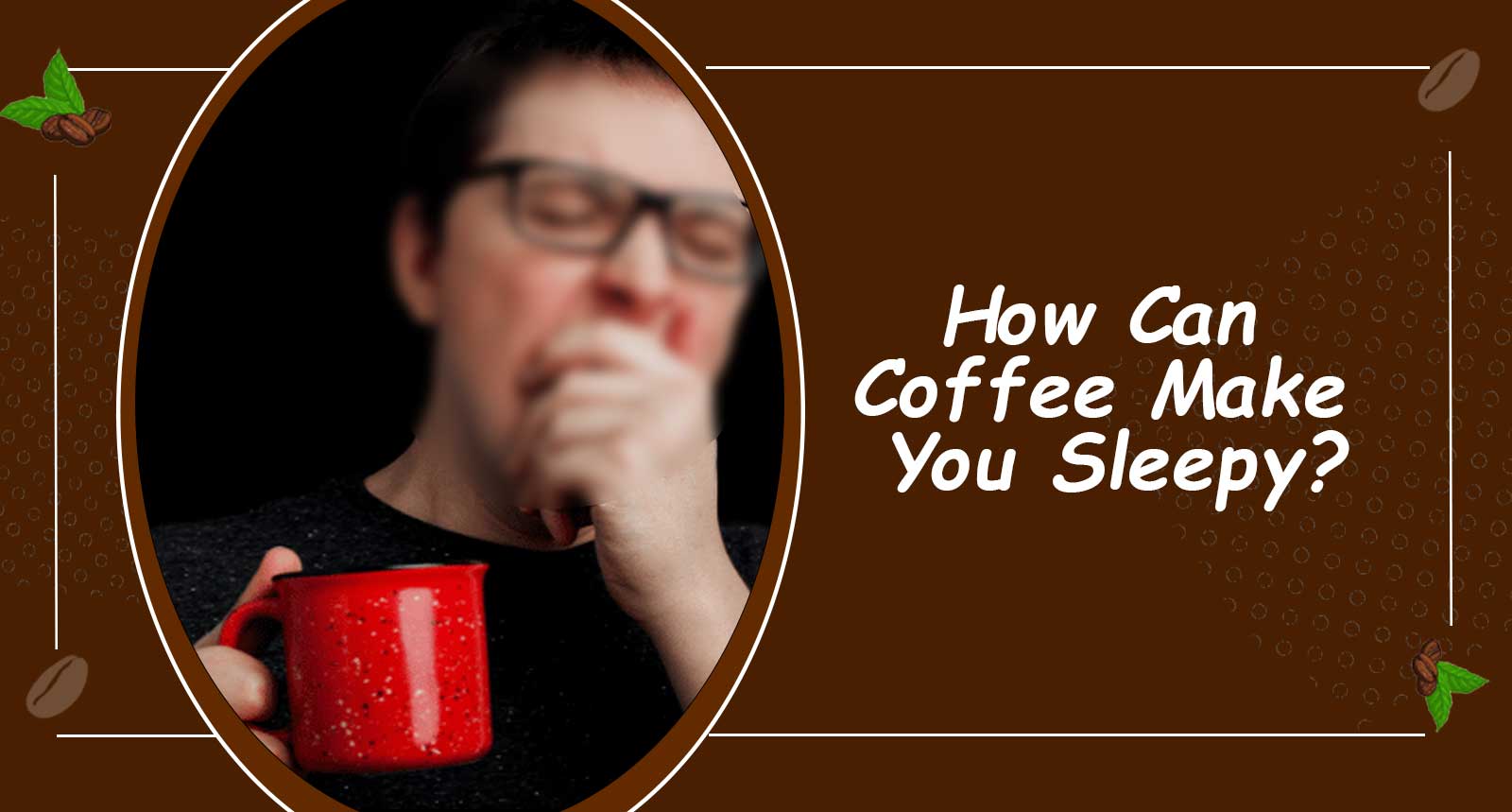Before diving into the world of coffee and its surprising ability to induce sleepiness, it’s essential to understand the complex relationship between caffeine and our bodies.
Coffee is celebrated for its wakefulness-boosting properties, but what happens when it has the opposite effect? This article delves into the intriguing question: How can coffee make you sleepy?
Why Would Drinking Coffee Make You Feel Tired?
It might sound counterintuitive, but drinking coffee can, in certain circumstances, leave you feeling more tired than energized.
This phenomenon stems from several factors that interact with the body’s natural processes. Let’s explore why your favorite cup of joe can sometimes result in unexpected drowsiness:
Caffeine Crash
Caffeine is a potent stimulant that temporarily wards off sleepiness by blocking adenosine receptors in the brain.
However, once the caffeine’s effects wear off, adenosine floods these receptors, often leading to a pronounced crash in alertness. The result? Sudden tiredness, which can feel more intense than your initial grogginess.
Adrenal Fatigue
Regular coffee consumption, especially in excessive amounts, can put a strain on the adrenal glands. These glands produce hormones like cortisol, which help regulate energy levels.
Over time, excessive coffee intake can lead to adrenal fatigue, causing a sense of tiredness even when caffeine is present in your system.
Dehydration
Coffee is a diuretic, which means it can lead to increased urination and, subsequently, dehydration. Dehydration can leave you feeling sluggish and tired. To make matters worse, many coffee lovers forget to drink enough water, compounding the issue.
Sleep Disruption
Enjoying a late-afternoon or evening cup of coffee can interfere with your sleep cycle. The half-life of caffeine (the time it takes for half of the caffeine to be eliminated from your body) can vary from person to person, but even a late-day coffee can disrupt your sleep, making you feel tired the following day.
Understanding these factors can shed light on why coffee occasionally has the paradoxical effect of making you feel tired.
But don’t worry; there are ways to enjoy your coffee without succumbing to unexpected drowsiness. Keep reading to discover strategies for maintaining the perfect balance between coffee and alertness.
How Can Coffee Make Me Sleepy?
So, you’re here wondering how that trusty cup of coffee, the one you’ve always relied on for an energy boost, can sometimes leave you feeling inexplicably tired.
Now, I’m sure you know that caffeine is a powerful stimulant found in coffee. It’s what gives us that initial jolt of alertness.
But here’s the catch: once the caffeine’s magic has worked and worn off, our brains experience a rebound effect. Adenosine, a natural sleep-inducing chemical, starts to flood our brain’s receptors, which were temporarily blocked by caffeine.
The result? A sudden, often overwhelming sense of tiredness. You’re not alone in feeling this – it’s a common experience among coffee lovers like us.
Seasonal Fatigue
My journey with coffee led me to discover the concept of adrenal fatigue. The adrenal glands, responsible for producing hormones like cortisol, play a vital role in regulating our energy levels.
Regularly overindulging in coffee can push these glands into overdrive, potentially causing them to tire out. And when the adrenals are fatigued, it can leave you feeling tired, even if you’ve had your daily dose of caffeine.
Let’s not forget that coffee is a diuretic, which means it can make you urinate more frequently. This increased fluid loss can lead to dehydration, and we all know how dehydration can leave us feeling sluggish and tired. And here’s the kicker: many of us, myself included, often forget to compensate by drinking enough water.
Sleep Disruption
As a coffee enthusiast, I sometimes found myself enjoying a cup in the late afternoon or evening, thinking it wouldn’t affect my sleep.
But boy, was I wrong! The half-life of caffeine varies from person to person, but it means that even an evening coffee can interfere with your sleep cycle. The result? Feeling tired and groggy the next day.
So, there you have it. I’ve been on the same journey of discovery, and now we understand why coffee can sometimes have the peculiar effect of making us sleepy.
But don’t worry, there are ways to enjoy your coffee while avoiding the dreaded caffeine-induced drowsiness. Stay with me to learn some strategies for striking the perfect balance between coffee and alertness.
What Was the Reason Behind Coffee Can Make You Sleepy?
Have you ever wondered about the science behind why coffee, that beloved pick-me-up, can sometimes leave you feeling drowsy? Let’s unravel the mysteries and discover the reasons why coffee has the potential to make you sleepy:
Intriguing Caffeine Crash
It all starts with caffeine, the key player in your coffee cup. Caffeine is a central nervous system stimulant that works by blocking adenosine receptors in the brain.
Adenosine is a neurotransmitter responsible for making us feel sleepy. So, when caffeine is on the scene, it prevents adenosine from doing its job and keeps you alert.
However, once the caffeine’s effects wear off, the suppressed adenosine rushes in, often causing a significant drop in alertness, resulting in tiredness.
Unveiling Adrenal Fatigue
Coffee lovers, like yourself, may not be aware of the concept of adrenal fatigue. It’s a condition that can develop from excessive coffee consumption, especially in large quantities.
Your adrenal glands, responsible for producing hormones like cortisol, can become overworked. The result? You might feel tired even when caffeine is in your system, due to the strain on these vital glands.
Hidden Culprit
Dehydration might not be the first thing that comes to mind when you think about coffee. But the truth is, coffee is a diuretic, meaning it promotes increased urination.
This extra fluid loss can lead to dehydration, a state that’s notorious for causing tiredness. To make matters more complicated, many coffee enthusiasts forget to compensate for this fluid loss by drinking enough water.
Coffee’s Impact on Sleep
Enjoying that comforting cup of coffee in the late afternoon or evening might seem harmless, but it can significantly disrupt your sleep.
The half-life of caffeine varies from person to person, and even a late-day coffee can interfere with your sleep cycle. This interference can lead to feeling tired and fatigued when you’d rather be alert and productive.
Now that we’ve peeled back the layers and uncovered the reasons why coffee can sometimes make you feel sleepy, stay with me as we explore strategies for finding the perfect balance between savoring your coffee and staying wide awake.
Conclusion
It’s been an eye-opening experience, and now, it’s time to draw some conclusions: Adrenal fatigue is a concern for the devoted coffee drinker. Those adrenal glands, working hard to produce cortisol and manage our energy levels, can become fatigued from excessive caffeine consumption, leaving us feeling tired despite the coffee coursing through our veins.
Dehydration is another sneaky culprit. Coffee’s diuretic effects can lead to fluid loss and dehydration, a well-known cause of sluggishness. It’s essential to remember to balance your coffee intake with adequate hydration.
And lastly, the timing of your coffee matters. Having that late-afternoon or evening cup can disrupt your sleep, making you feel tired the next day. It’s a reminder that the impact of caffeine lingers longer than we might think.
FAQs( Frequently Asked Question)
1. Can coffee really make me feel tired?
Yes, it can. While coffee is renowned for its energizing effects, it can backfire and leave you feeling tired, often due to factors like the caffeine crash, adrenal fatigue, dehydration, and sleep disruption.
2. How can I avoid feeling tired after drinking coffee?
To avoid the post-coffee slump, you can consider moderating your coffee intake, staying well-hydrated, and being mindful of when you consume coffee, particularly in the evening. Balancing caffeine consumption and proper hydration is key.
3. What’s the ideal time to drink coffee to prevent sleepiness?
The ideal time to enjoy your coffee without affecting your sleep is usually in the morning or early afternoon. It’s essential to be aware of your body’s caffeine sensitivity and adjust your coffee consumption accordingly.
4. How much coffee is too much?
The optimal coffee intake varies from person to person. However, exceeding 400 milligrams of caffeine (about four cups of brewed coffee) per day is generally not recommended. Keep your personal tolerance and overall health in mind.
5. Are there any alternatives to coffee if I want to stay awake and alert?
If you’re looking to reduce your coffee intake, you can explore alternatives like green tea, herbal teas, or even just staying hydrated with water.

